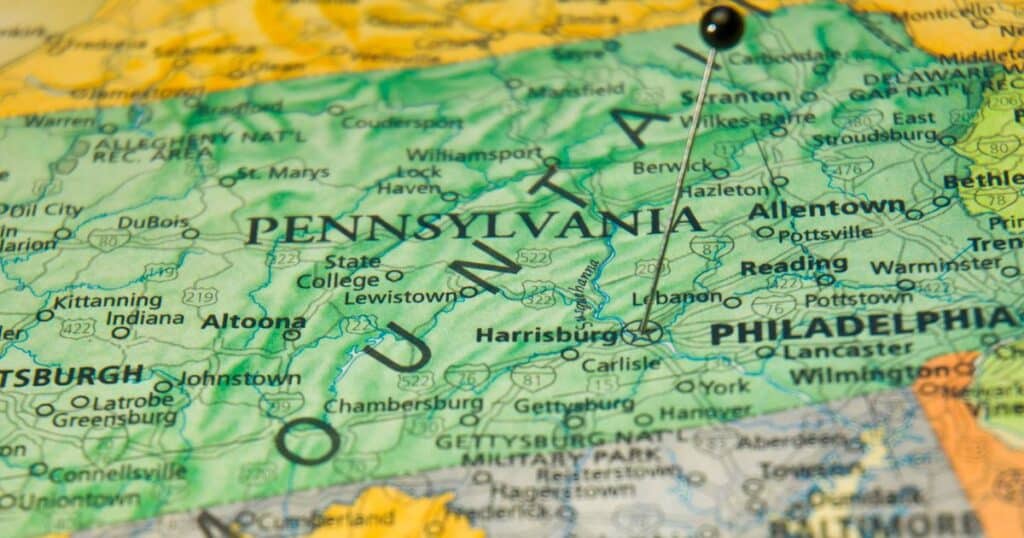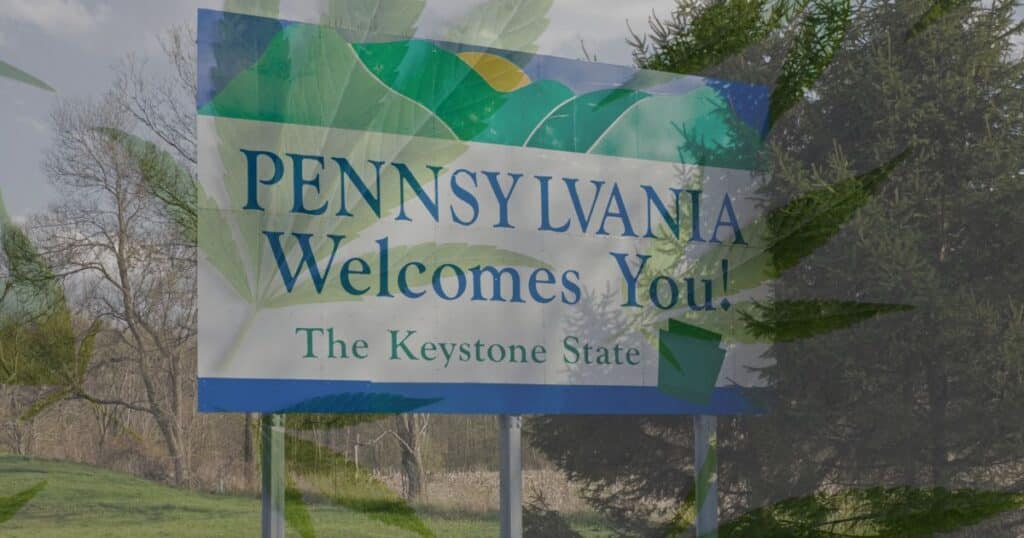With the growing support for cannabis legalization in the United States, Pennsylvania is facing an important decision. Governor Josh Shapiro has acknowledged the financial and social impact of the state’s current cannabis policies and has proposed the legalization of adult-use marijuana in his 2024-25 executive state budget.
This proposal has significant implications, affecting not only cannabis enthusiasts and residents of Pennsylvania but also policymakers and stakeholders across the state.

Governor Shapiro’s proposal makes a lot of economic sense. He’s pointing out a hard truth: Pennsylvania is missing out on a ton of tax revenue by holding onto its strict stance on cannabis.
Meanwhile, all neighboring states, except West Virginia are riding the green wave of cannabis legalization and gaining a competitive advantage that Pennsylvania can’t afford to ignore. It’s like passing up golden opportunities for growth and financial stability while other places are cashing in on the booming cannabis industry.
The Tax Dollar Discussion
The fiscal argument for cannabis legalization cannot be overstated. Governor Shapiro’s plan posits that a 20% tax on regulated cannabis products could generate an impressive windfall reports the Philadelphia Inquirer.
Initial estimates suggest that Pennsylvania could see tax revenues of up to $230 million within the first four years of a fully operational adult-use cannabis market—a significant boon for a state grappling with budgetary shortfalls and increasing expenditure demands. Such funds could be directed toward vital state services, infrastructure, education, and more.
The economic imperative is not the only driving force behind Governor Shapiro’s proposal. The call for cannabis legalization in Pennsylvania is also a call for social justice and restoration.
The budget allocates funds—$5 million—to support restorative justice initiatives, serving as a critical step in addressing the harm done to individuals caught in the crosshairs of the War on Drugs, especially those from marginalized and over-policed communities.
Furthermore, the proposal includes provisions for the immediate expungement of records related to nonviolent cannabis possession, offering a pathway to redemption for many.
In addition to the compelling economic and social justice arguments, Pennsylvania’s move towards legalizing cannabis is underscored by the need to more appropriately allocate law enforcement resources.
With police and courts systemically overburdened, it is becoming increasingly clear that the pursuit and prosecution of cannabis-related offenses are an inefficient use of resources. Governor Shapiro’s legislative efforts aim to refocus priorities, suggesting that law enforcement’s time and efforts should be directed towards more pressing criminal issues rather than the use of marijuana by adults.
The Republican Response and the Legislative Landscape
Despite these compelling arguments, the path to legalization is fraught with political complexity. Pennsylvania’s Republican leadership, which holds sway over the state Senate, has traditionally opposed such overtures.
However, there are signs of a potential shift. Senate Majority Leader Joe Pittman and other GOP members have expressed a willingness to consider the proposal, especially given the pressing need to address the state’s revenue shortfall.
“We also need to understand where the governor is coming from,” said Senate Majority Leader Joe Pittman (R)
Bipartisan efforts, including cosponsorship from Republican senators, indicate a growing openness to the possibility of cannabis reform. Nonetheless, the fate of legalization remains uncertain, and the layout of the legislative battlefield is far from definitive. The coming months will be pivotal as the governor and state lawmakers navigate the intricate path toward cannabis reform.
In a press release from May of 2023 Senator. Dan Laughlin (R) had this to say about adult-use legalization in Pennsylvania:
“Legalized adult use of marijuana is supported by an overwhelming majority of Pennsylvanians and this legislation accomplishes that while also ensuring safety and social equity,” said Laughlin. “With neighboring states New Jersey and New York implementing adult use, we have a duty to Pennsylvania taxpayers to legalize adult-use marijuana to avoid losing out on hundreds of millions of dollars of new tax revenue and thousands of new jobs.”
What Comes Next?
Shapiro’s budget is not the definitive legislation for cannabis legalization but a comprehensive roadmap for potential reform. How, then, do lawmakers move from this proposal to a fleshed-out, actionable plan that can command bipartisan support? The challenge lies in crafting a legalization framework that addresses multiple facets—from regulating the industry and ensuring public safety to creating equitable opportunities for all Pennsylvanians.
The timeline outlined in the proposed budget signifies a momentous shift in policy—a shift poised to mark Pennsylvania’s entry into the landscape of states permitting adult-use cannabis. The Governor’s roadmap defines a clear schedule: the legalization of adult-use cannabis effective as of July 1, 2024, with a six-month preparatory period leading to the commencement of sales within Pennsylvania from January 1, 2025.
This interval is designed to allow state agencies, businesses, and public safety officials ample time to craft regulations, establish protocols, and address any concerns related to the cultivation, distribution, sale, and consumption of cannabis, thereby ensuring a well-regulated market from the outset.
The Governor’s proposal positions cannabis as the next “cash crop” for Pennsylvania’s farmers, implying a substantial shift in the state’s agricultural portfolio that could bring significant economic prosperity.
By entering the legal cannabis market, farmers in the state may diversify their production and tap into a new, lucrative industry with a high demand. The regulatory responsibility for the industry is proposed to fall under the scope of the Pennsylvania Department of Agriculture.
Speed and practicality need to be balanced with thoroughness and inclusivity. State legislators should carefully examine the successes and pitfalls of cannabis programs in other states to create a unique solution for Pennsylvania. This solution should leverage best practices while addressing state-specific considerations. Transparency, stakeholder input, and an evidence-based approach are vital components of this process.

As the debate on cannabis legalization simmers in Pennsylvania, two certainties emerge the state’s dire need for revenue and Governor Shapiro’s push for reform. The prospect of realizing a regulated, adult-use cannabis market in Pennsylvania is within reach, but it will require concerted effort, compromise, and a shared commitment to the commonwealth’s future.
Pennsylvania needs tax revenue, and cannabis can play a crucial role in filling that void. By legalizing and regulating adult-use cannabis, the state can tap into its potential as a lucrative industry. Not only will this generate much-needed revenue, but it will also create jobs and stimulate economic growth. It’s time for Pennsylvania to embrace the benefits of cannabis and harness its power to drive positive change for the state and its citizens.
Keep updated on all the latest news and updates in the Cannabis industry here at Beard Bros Pharms by signing up for our Friday Sesh Newsletter here. Always Dank and Never Spam!

















